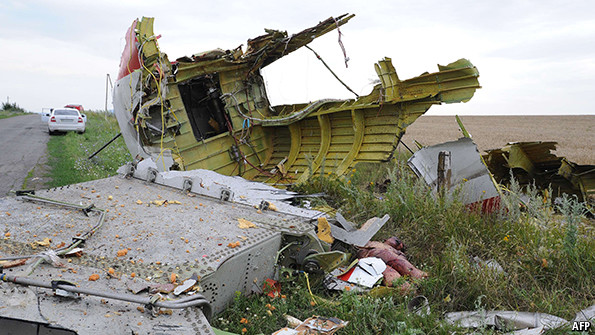
THE circumstantial evidence for what happened to Malaysia Airlines Flight 17 and to the 298 people on board is already powerful. But there are still many unresolved questions, the answer to which will have a major bearing on what happens next. There is little or no doubt that the aircraft, which was flying above eastern Ukraine at 33,000 feet, was shot down by a Russian-designed surface-to-air missile, almost certainly a Buk missile (known as the SA-17 in the West) or just possibly a more powerful S-300 (designated SA-10 by NATO).
Both systems are in use by Russian and Ukrainian forces. It appears that the missile was launched from Chernukhino, near Snezhnoye, about 80km from Donetsk, in territory controlled by Russian separatists and about 20km from the main crash site. That is easily within the range of even the earliest Buk systems which were developed in the 1970s by the Soviet Union.
Early on July 17th, several hours before MH17 was destroyed, journalists from the Associated Press reported seeing a launcher near Snezhnoye that they said looked like a Buk system. Igor Sutyagin, a Russian expert at RUSI, a London-based think-tank, says that four hours before news of the shooting down spread, reports were coming in from social media of sightings of the launcher near what became the crash site. Previously, there had been reports about separatist rebels boasting of having captured Buk missiles from a Ukrainian army base near Donetsk. The reports first surfaced on June 29th and were mainly carried by Russian state news agencies. According to sources, the story first ran on TV Zvezda, the news agency of the Russian defence ministry. A major question is whether the missile system was really stolen or whether the story was planted to provide cover for the Russians providing the rebels surreptitiously with advanced weaponry.
A further question is whether the rebels would have had the technical capability of operating the system without Russian military help. The answer is that a properly trained crew would normally be needed, but that a partially trained crew might be able to work it without fully realising what they were doing. That seems the most likely explanation for what happened. On July 14th a Ukrainian military cargo plane, an Antonov-26, with eight people on board was brought down over the village of Davydo Myilske in the Luhansk region, a few miles from the Russian border. The aircraft was flying at 21,000 feet, well beyond the altitude range of shoulder-fired missiles, such as the Strela, used by the rebels to shoot down planes before. It seems that the people responsible for the destruction of MH17 thought they were taking out another military plane and not a civilian airliner.
Last night Ukraine’s intelligence agency, the SBU, released audio from what appeared to be intercepted phone calls between rebels and a Russian intelligence official. In one call, a separatist leader, Igor Bezler, says that they “have just shot down a plane”. In a later call, apparently from the crash site, another man says that Cossack militiamen have shot the plane down and that it was a passenger airliner. When asked if there are any signs of military equipment among the wreckage, he replies “absolutely nothing”.
It all suggests a tragic mistake made by reckless incompetents who may or may not have been receiving direct help from Russian handlers, who may or may not have been operating with official approval. Russia’s president, Vladimir Putin, after a call yesterday with Barack Obama that began before news of the shooting down had broken, has already tried to shift responsibility for the crime to the renewed offensive in the east by Ukrainian forces ordered by President Petro Poroshenko to regain control of territory ceded to the rebels. Some Russian commentators have even tried to pin the blame on the Ukrainian armed forces—an incredible charge because the Ukrainians have had no need to use air defence systems against an enemy that has no aircraft.
In the hours and days ahead, as more information about exactly what happened emerges, the great question will be what part, if any, Russia played in the tragedy of Flight MH17.

No hay comentarios.:
Publicar un comentario